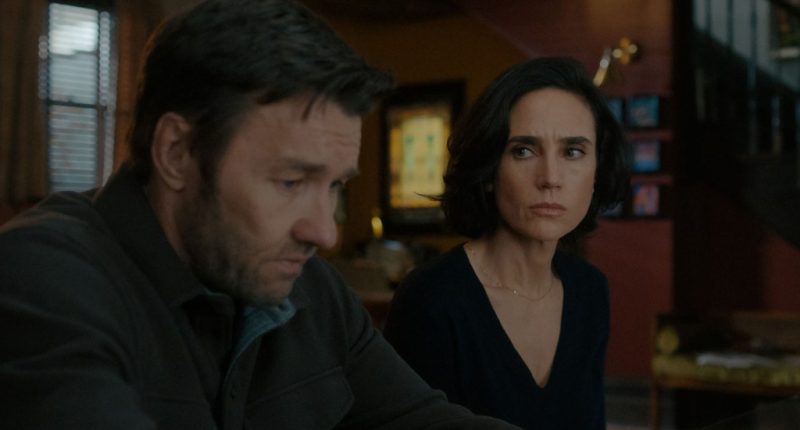Have you ever watched It’s a Wonderful Life and wished that Frank Capra had paused to show us Clarence the Angel explaining to George Bailey how he was able to present him with the experience of a world in which he was never born?
Chances are good you haven’t — that you appreciate that the surest way to ruin whimsy is to “But actually…” it.
Dark Matter
The Bottom Line
Lots of ideas, but only one tone.
Airdate: Wednesday, May 8 (Apple TV+)
Cast: Joel Edgerton, Jennifer Connelly, Alice Braga, Jimmi Simpson, Oakes Fegley, Dayo Okeniyi
Creator: Blake Crouch
But if you have, indeed, yearned for a version of It’s a Wonderful Life in which “magic” was replaced by a literal black box and “joy and sadness and general wonderment” by “dejection and self-seriousness and general washed-out solemnity,” Apple TV+‘s adaptation of Blake Crouch’s Dark Matter may be in your wheelhouse. It’s a series that doesn’t lack for ingenuity and, especially in the last two hours, ideas pop up that border on inspired, but the lack of tonal variation ultimately dooms Dark Matter. It’s an unrelenting dirge that could have benefitted from an occasional dose of fun and perhaps an occasional willingness to trust whimsy delivered without momentum-draining explanations.
Joel Edgerton plays Jason Dessen, a Chicago-area physicist living an unremarkably content life with his wife Daniela (Jennifer Connelly), an art gallery something-or-other, and teenage son Charlie (Oakes Fegley). At one point, Jason had dreams of making big discoveries and winning big prizes, but in prioritizing his family, he chose a life that has him giving lackluster lectures to uninterested college students. In familiar TV/movie fashion, we happen to meet Jason as he’s trying to explain Schrödinger’s Cat and the paradox of “superposition” to a class; he’ll spend much of the rest of the series repeatedly trying to explain the same to us.
Jason’s friend Ryan (Jimmi Simpson), who does other science-guy stuff, has won some big science-y prize and Jason is semi-secretly resentful — something about the path not taken and the life not lived.
The opportunity to experience that path not taken comes when Jason is abducted by … Jason Dessen from an alternate reality. Jason2 takes Jason1’s life and leaves Jason1 stranded in Jason2’s world, living his professionally richer (but spiritually poorer) life. But like James Van Der Beek responding to patriarchal Texans in Varsity Blues, Jason1 doesn’t want Jason2’s life. He goes about setting things right with the help of a magical physics box known as The Box, which gives him the opportunity to mansplain the paradox of superposition to Jason2’s girlfriend, Amanda (Alice Braga).
It might sound as if that summary, as well as the trailer for Dark Matter, is spoiler-y. It isn’t. One or two unexpected things happen in Dark Matter, but what I described was the premise, and the show is generally without twists. Also, it might sound from that summary like Dark Matter is a confusing show. It isn’t. All confusion in the story comes either from the characters on the screen functioning five steps behind the audience or from intentional decisions by the directors/editors to present simple things in confusing ways as an odd substitute for presenting confusing things in entertaining ways. This is not Counterpart, the short-lived Starz drama about the intersection between parallel worlds that may have been too smart for its own good. It’s more like Discounterpart.
The impressive line that Capra walks in It’s a Wonderful Life allows us to simultaneously see all the failures in George Bailey’s life and yet still know, even without Clarence telling him or us, that it was a good life. It’s both at once! Talk about superposition. Dark Matter wants to do something similar, which you’d probably understand even without the multiple winking nods and then the not-so-winking nod of a character running through a snowy street and past a movie theater showing It’s a Wonderful Life. Yet it fails.
Sometimes it’s hard to identify where a show goes wrong, but with Dark Matter it’s very easy. The first three episodes are directed by Jakob Verbruggen, a veteran of House of Cards and The Alienist, and an impressive visual stylist of a certain murky sort — definitely not the guy you go to if you want your series to be anything other than monomaniacally bleak. The series starts with a cold open featuring a guy bumping around in a dark, wet room of some sort. It introduces viewers to nothing other than moodiness, and while we’ll eventually understand what was happening in broad strokes, nothing is established other than a deadened chill.
It’s exactly the wrong way to start a series, because it puts the immediate emphasis on shadowy mystery, and we only then witness Jason1’s life and it, too, is muted. If the series doesn’t establish Jason1’s life in a way that makes us understand why he’s eager to get back to it, we’re only invested in his journey in a perfunctory way. We spend nine episodes watching Jason1 attempt to get his life back because cosmic disorder is bad, not because there’s any warmth to what we’re introduced to. Over the three episodes Verbruggen directs, there are almost no smiles, no jokes, no colors in the cinematography, nothing Capra-esque.
This is clearly what Crouch, creator and showrunner, wanted in his take on his own novel, because even after subsequent directors take over for Verbruggen, a downcast affect reigns. Multiple episodes occur in a conceptual realm known as The Corridor, a manifestation of the multiverse, a concept that Jason1 keeps needing to talk Amanda through, as if the Marvel Cinematic Universe didn’t exist in Jason2’s universe.
It’s a repetitive cycle of outlandish worlds in which Chicago is engulfed by snow and ice and fire, yet none so outlandish that the White Sox make the playoffs. I kid, but my kingdom for a three-second glimpse of a Chicago populated by human-sized ducks if only to say, “Yeah, this is borderline silly, but at least the show knows it.” Even in those two final episodes in which Dark Matter finally lands in some of the extreme places I’d been craving for hours and director Alik Sakharov finds some energy to burst through the suffocation, I still felt like I was laughing at wild stuff that the show meant me to be taking seriously.
I’m not sure I’ve ever seen an actor taking less visible pleasure in a project that lets him play two different versions of the same character than Edgerton here. Edgerton keeps both men similarly intense and mumbly, so much that it’s nearly a thought experiment in anti-entertainment. If Jason1 didn’t acquire some facial wounds as part of the initial abduction there would be no distinguishing between the characters 95 percent of the time. The other five percent of the time, Jason2 has a “hard edge” so obvious that you want to shout at Daniela and Charlie for missing it.
Although she gets to try on several different hair styles — Jason isn’t the only character to exist in multiple realities — there’s little in Daniela to require an actress of Connelly’s stature. She has one meltdown in a later episode that’s so earned and so well-executed that I wished she’d been given more. Still, she has a bounty compared to Braga, who, for her part, at least gets a small mid-season arc, compared to several key characters from Jason2’s world so comically underdeveloped that their “storylines” are resolved in a closing montage after they’ve already been gone for three or four full hours. A show with this many actors playing this many alternate identities should be a smorgasbord of acting opportunities. Dark Matter is not.
Where Dark Matter ends up is not in the boundary-breaking corner of the Apple TV+ library with shows like Severance or Pachinko or For All Mankind; rather, it’s in the corner filled with shows that rebuke the notion that, at its peak, the human experience is composed of all manner of tones, misinterpreting “disheartened” as a synonym for “prestige.” I’m thinking of interchangeably photographed star magnets like Defending Jacob, Lisey’s Story, The Crowded Room and the similarly Chicago-set and genre-bending Shining Girls — not exactly “bad,” but with the airless consistency of a loaf of bread that never quite managed to rise.
Also Read More: World News | Entertainment News | Celebrity News









